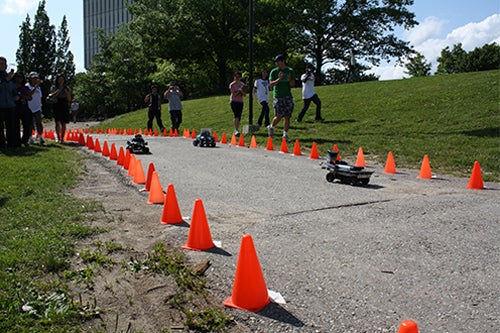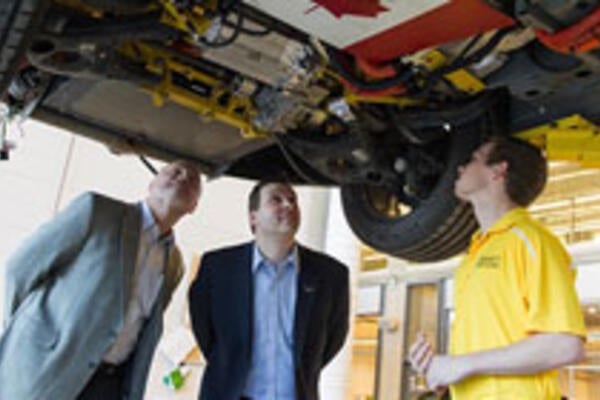
Robot race gives Waterloo students hands-on experience
International robot competition comes home to University of Waterloo

International robot competition comes home to University of Waterloo
By Megan Vander Woude Faculty of EngineeringA team of engineering students from the University of Waterloo will compete at the International Autonomous Robot Racing Competition (IARRC) on campus this weekend.
The event, happening on Saturday July 26, includes drag and circuit races between student-built robots, and provides students with real-world, hands-on design challenges.
Four teams will participate this year, including Georgia Institute of Technology, the first competitor from the United States. Each team built a robot from scratch, or modified a small RC car, to be raced twice during the competition - once in a drag race, and again in a circuit race, where robots defeat obstacles on a twisting track.

Steven Waslander, a professor in Waterloo’s Mechanical and Mechatronics Engineering department, says: “The core challenge of the IARRC event is to make a simple, cheap, and intelligent robot drive as fast as possible in an uncertain environment without any external help.”
Without remote controls, competing robots are left completely to their own devices once their start buttons are pressed. The real challenge for teams isn’t the racing, it’s to create and test a robot that will work correctly on its own, using limited supplies and funds.
“Students who compete in this event learn a great deal about the many aspects of design, integration, and testing that are needed to make a reliable system with restricted funds. They learn to machine, solder, build, program and debug on the fly and under pressure. This experience serves them very well in industry, where teamwork, flexibility and working under pressure are essential to a successful career,” says Waslander.
Autonomous robots like the ones built for IARRC are used in a variety of real-world scenarios, including space exploration, mining, search and rescue, remote sensing and automotive inspection. Some are used for daily tasks like vacuuming, mowing lawns, parking cars and, in future, driving cars.
When asked about the event’s challenges, Sirui Song, a graduate student and IARRC organizer and participant, stressed the importance of teamwork: “Through robot racing, students learn more about cooperation than competition.”
With students coming together from many engineering disciplines, Song’s team is truly collaborative. During every stage of the competition, from designing their robot to racing it, the team must work together, sharing ideas and communicating about the work they’ve done on the robot.
Waterloo introduced the IARRC in 2005, in an effort to promote research in autonomous mobile robotics technology. This year will be the University’s second time hosting the competition. Spectators are welcome to attend all portions of the event.

Read more
The Waterloo student team building the world’s first functional pneumatic hyperloop levitation system will share major milestone

Read more
Special issue of Waterloo Magazine celebrates women who lead, and explores equity in education and the workplace

Read more
Innovative automotive research at Waterloo attracts GM executives looking to grow established partnership
The University of Waterloo acknowledges that much of our work takes place on the traditional territory of the Neutral, Anishinaabeg, and Haudenosaunee peoples. Our main campus is situated on the Haldimand Tract, the land granted to the Six Nations that includes six miles on each side of the Grand River. Our active work toward reconciliation takes place across our campuses through research, learning, teaching, and community building, and is co-ordinated within the Office of Indigenous Relations.